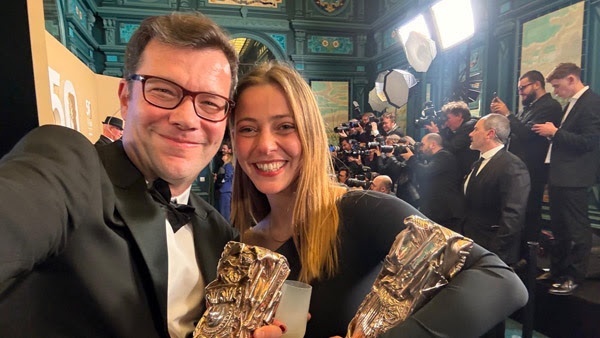

On the home front, the Slovenian Film Centre summed up its 2024 activities and announced plans for 2025 at its annual press conference. The cinema component of the European Cultural Capital GO 2025 shared by the townships of Nova Gorica in Slovenia and Gorizia in Italy takes its shape not just in the form of the newly founded Gorica Film Commission, but also in the shape of the very first film that it funded: Matteo Oleotto finished shooting The Last Slap. Within the same framework of the ECC, the CEE Animation Conference GO! 2025 took place in Vipolže and Kinemax Gorizia theatre. The SFC took part in celebrating the Cultural Holiday (February 8) with free screenings of selected films, selected film professionals were crowned with the France Prešern awards for cultural workers, while the Association of the Slovenian Directors handed out its annual France Štiglic awards later in February.
On the sad news side, the pioneer of TV directing in Slovenia, Marija Šeme Baričevič, left us, and so did the Croatian screenwriter and filmmaker Sara Hribar who also left her mark in the Slovenian cinema as the co-writer of Marko Šantić’s Wake Me (2022).
Cinema is, however, a lasting process based on the efforts and striving of many people – and we are still Ready to Roll!
The SFC annual report
On February 10, the Slovenian Film Centre had its annual press conference in Ljubljana. The media representatives were informed about the achievements of the Slovenian cinema in the last year and the plans for the year ahead of us.
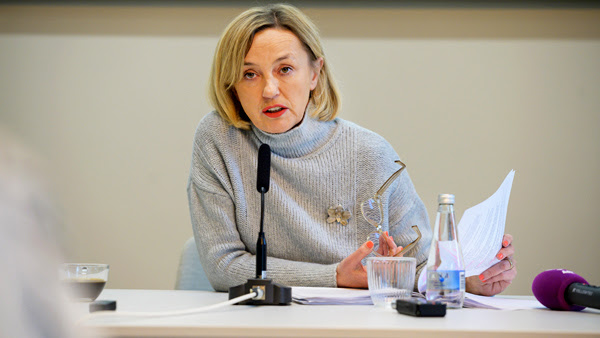
Nine feature-length fiction projects were supported for the script development, seven for project development and seven more for realization. The latter include projects by Andrina Mračnikar, Goran Vojnović, Tijana Zinajić, Janez Burger, Tomaž Gorkič, Katarina Morano and Vida Breže. Regarding documentaries, six projects in different phases of development were supported, while the support of the realization was also granted to six more projects directed by Nika Autor, Igor Zupe, Marko Šantić, Sašo Podgoršek, Jakob Krese and Anna M Bofarull. Additionally, four fiction and animated short films were also supported. The SFC also communicated the box office figures for 2024, and there was a slight fall in total figures, from 1.94 to 1.66 million tickets sold. However, the number of admissions to the screenings of the domestic films rose both in absolute numbers (from 170 to 195 thousand), as well as regarding the share which now stands around 11.75% mark.
It is expected that 10 fiction features will enter the principal photography process this year. Along with Mračnikar’s Mila/Marija (produced by Vertigo), Morano’s Seaview (also Vertigo), Burger’s One Month (Staragara) and Vojnović’s Yugoslavia, My Fatherland (Arsmedia), the list of projects includes the debuts Uncomfortable Beings by Maja Križnik (December) and Lost Years by Áron Horváth (Temporama), as well as the new projects by more seasoned filmmakers, such as Igor Šterk’s Tartufferies (Studio Virc), Darko Sinko’s Confirmation (December), Sara Kern’s A Way Away (Spok) and Gregor Božič’s Tales of Fruits and Monsters (Nosorogi). The same also goes for four TV series run by filmmakers Tomaž Gorkič, Matevž Luzar, Žiga Virc and Aleš Žemlja.
Regarding distribution, ten fiction features, ten feature-length documentaries, one animated feature and five Slovenian minority co-productions should be distributed in 2025. Some of those are already in distribution, such as Jani Sever’s Ciao Bela, Matevž Jerman and Jurij Meden’s Alpe-Adria Underground!, Nina Blažin’s The Silence of Life, Ema Kugler’s Once upon a Time in Soča Valley. Urška Djukić’s Little Trouble Girls entered the distribution after winning the FIPRESCI prize in the newly established Perspectives competition at Berlinale. The same is expected for the prominent festival titles such as the minority co-production Fiume o morte! by Igor Bezinović that won the Tiger and the FIPRESCI award at Rotterdam and for the Czech-French-Slovak-Slovenian parity co-production, the animated feature Tales from the Magic Garden (directed by Patrik Pašš, Jean-Claude Rozec, David Súkup and Leon Vidmar) that recently premiered at Generation section of Berlinale.
A significant raise of budget, from €8.5 million in 2024 to €12.35 million in 2025 also resulted in updating the strategy for the period from 2025-2029. It is aimed at addressing the challenges of keeping the institution’s independence, further strengthening the financial ecosystem and stronger promotion of Slovenian cinema both domestically and abroad. Two more specific calls will be open, one for the genre-specific projects with higher commercial potential that would run in series from script development via project development to production, and another for the production of micro-budget projects up to €100.000.
Lastly, the dates are also set for the upcoming edition of the Festival of Slovenian Film. It will take place in Portorož in late October (21-26).
More information is available here.
International successes
Slovenian cinema had some strong presence at the two biggest winter film gatherings in Europe. At the International Film Festival Rotterdam, Slovenia as the (co-)production country was listed with five films, three shorts and two features. Two shorts, Gregor Božič’s Common Pear (screened at the shorts competition) and Davorin Merc’s ...Yellow Dawn, which was screened out of competition, are purely Slovenian works. Minority co-production Upon Sunrise, directed by Stefan Ivančić, was also screened in the out-of-competition shorts sidebar, while two minority co-productions, Stefan Đorđević’s Wind Talk to Me and Igor Bezinović’s Fiume o morte! competed for the main Tiger award. The latter managed to win both the main award of the festival and the FIPRESCI award given by the film critics’ jury.
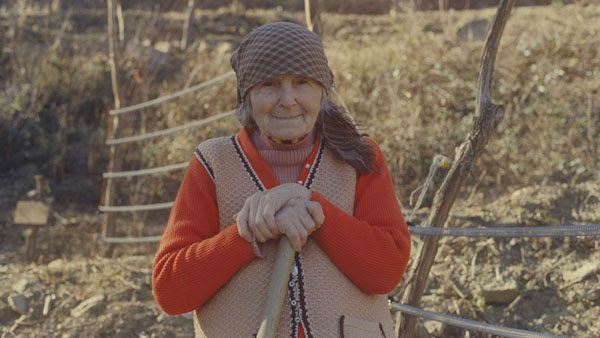
The docu-fiction reconstruction of the bizarre 16-month rule of the Italian “warrior-poet” Gabriele D’Annunzio over Rijeka in the first quarter of the 20th century mesmerized not just the festival and critics’ juries, but also the representatives of the media such as Variety, Screen Daily and Sight and Sound. The reputable trade papers praised Bezinović’s playful approach to the historical topic and his success to open a dialogue between the two periods of time, formally a century apart, but more close than anyone of us would like to admit. The Croatian-Italian-Slovenian co-production between the companies Restart, Videomante and Nosorogi already started its theatrical life at its home turf with a series of sold-out screenings in Rijeka followed by the tour of other Croatian cities, while the Slovenian premiere occurred at the Festival of Documentary Film in Ljubljana.
Berlinale was also marked with some strong Slovenian presence, the biggest since the country’s independence. Five Slovenian (co-)productions were screened across different sections: Želimir Žilnik’s docu-fiction Eighty Plus in Forum sidebar, Jakob Krese’s short documentary competed as a part of Berlinale Shorts, Generation 14Plus hosted the premiere of Čejen Černić Čanak’s Sandbag Dam, while the Generation KPlus section showcased the premiere of the feature-length animation Tales from the Magic Garden realized as a rare case of a parity co-production. However, the biggest spotlight right from the start was on Urška Djukić’s feature debut Little Trouble Girls that opened the newly established Perspectives competition.
Given that Little Trouble Girls ended up with the FIPRESCI award from the five-member film critics’ jury, the place in the spotlight paid off. On top of the award, Djukić’s film also reaped positive reviews from trades like Variety and Screen Daily, as well as reputable websites IONCINEMA, Eye for Film and Cineuropa. The critics praised Djukić’s gentle approach in treating the teenage girls’ sexual awakening lacing it with subtle religious symbolism, as well as the director’s use of music from external sources and Julij Zornik’s sound design. Shortly after the festival, Little Trouble Girls entered the national distribution with the gala premiere in Ljubljana on March 3, after which the distribution should expand throughout the country.
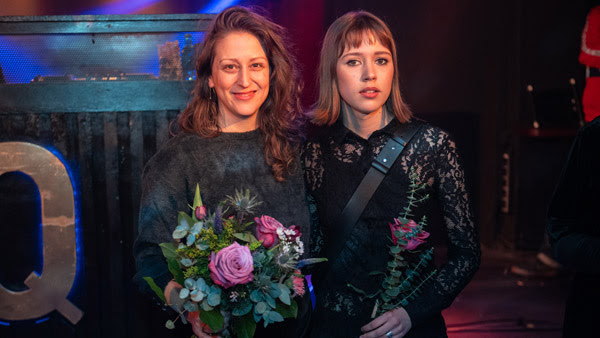
Shootings
The Gorizia-born Italian filmmaker Matteo Oleotto has just finished filming his newest film The Last Slap which could be regarded as the central cinema event of the 2025 European Culture Capital shared by Gorizia in Italy and Nova Gorica in Slovenia. It is also the first project partially funded by the newly established Goriška Film Commission, while its script is the first palpable product of the series of workshops under the umbrella of the ECC event.
Best known for his debut Zoran, My Nephew the Idiot (2013) which was set on both sides of the Slovenian-Italian border in Gorizia-Nova Gorica region, Oleotto comes back to the same territory geography- and genre-wise. Once again, we are about to have a chaotic and cathartic border-crossing comedy-drama this time revolving about two siblings getting involved with shady people while trying to make their dreams come true by renovating the old lakeside house they inherited, which leads them to the nightmare Christmas with lots of plot twists and slapping.
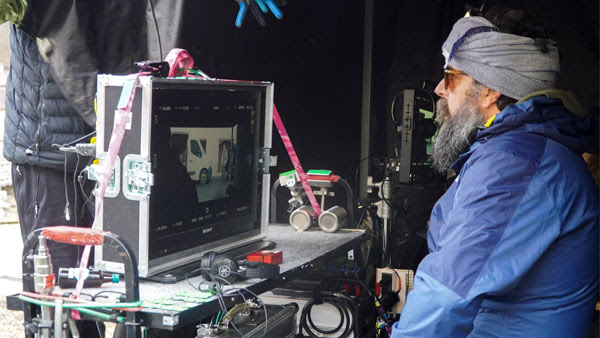
The Slovenian involvement is significant, from the locations to the crew, cast, production and services. For instance, Primož Pirnat has a prominent supporting role, Vasja Kokelj served as the production designer, while Mojca Gorogranc Petrushevska handled the make-up. The production was staged by the Italian branch of Staragara (represented by the producer Michele Neri) in co-production with Spok (represented by Jožko Rutar) and with the participation of RTV Slovenia and Rai Cinema. The Last Slap was also supported by the Italian Ministry of Culture, Slovenian Film Centre, Friuli-Venezia-Giulia Film Fund and Commission, as well as Goriška Film Commission and Viba Film.
Distribution
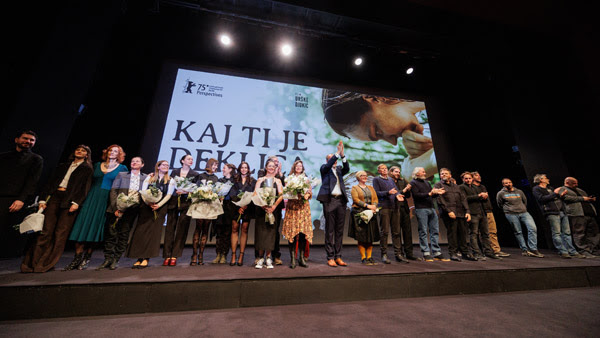
Regarding Slovenian fiction films, the beginning of the year was marked by Jani Sever’s Ciao Bela that is still in distribution in some of the Art Cinema Network theatres. Curiously, Perica Rai’s last year’s independently produced slasher It Was a Beautiful Day is formally still in distribution through special screenings. Another oddity is an independent war movie Ostri Vrh directed by Matic Poropatič that is also touring cinemas with special screenings. However, the high hopes are reserved for Urška Djukić’s Little Trouble Girls that enters the distribution shortly after the world premiere at Berlinale, crowned with the award of FIPRESCI jury. The national gala premiere took place in Cankarjev Dom in Ljubljana after which the distribution is widening to the theatres united in the Art Cinema Network.The documentaries of Nina Blažin (The Silence of Life), Ema Kugler (Once Upon a Time in Soča Valley) and Jan Cvitkovič (Gram of Heart) continued their theatrical life in the independent and city cinemas during February and March, while Maja Doroteja Prelog’s Cent’anni also had some additional screenings in the Kinodvor cinema. The release of Slobodan Maksimović’s documentary Praslovan both in the Art Cinema Network and Cinemaxx multiplex theatres is scheduled for March 27, after its national premiere at the Festival of Documentary Film. Praslovan could be classified as a creative music documentary that follows the career path of the singer-songwriter and eternal rebel Zoran Predin that world-premiered at the last year’s Sarajevo and it scooped the Vesna Audience Award at the Festival of Slovenian Film. Another Slovenian film entering distribution is Martin Turk’s Kino Volta, a docu-fiction about a lesser-known episode from the life of James Joyce who, during his Trieste years, was a partner in the movie theatre business and tried to expand it to his native Ireland.
Festival of Documentary Film
The 27th edition of Festival of Documentary Film took place from March 12-19 in Ljubljana. This year it is marked by the strong Slovenian presence, as the festival did the retrospective of Maja Weiss’ documentary body of work in five slots. The festival also screened Slobodan Maksimović’s Praslovan, which might serve as a warm-up for the film’s national theatrical release scheduled for later in March. Another news is the Slovenian premiere of Igor Bezinović’s Tiger Award-winner Fiume o morte!
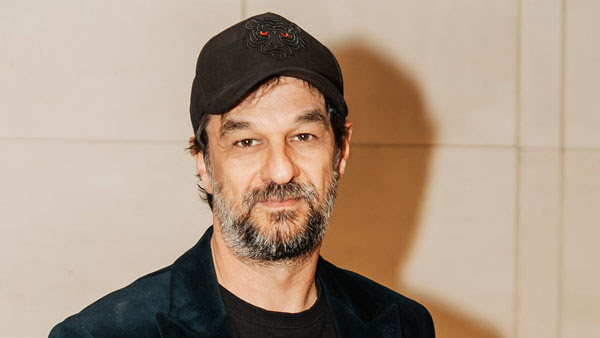
Regarding the rest of the competition programme, it consisted of heavy-hitters like the Oscar winnerNo Other Land andSoundtrack to a Coup d’Etat to name just a couple, while the works of Viktor Kosakovski (Architecton), Albert Serra (Afternoons of Solitude) and Göran Hugo Olsson (Israel Palestine od Swedish TV 1958-1989) were shown in the Currents programme section. Myths, Icons Media section also offered interesting titles like Radu Jude’sEight Postcards from Utopia and Andreas Veiel’sRiefenstahl, to name a couple.
Visions du Reel
This year’s edition of Visions du Reel documentary film festival takes place from April 4-13 on the well known location of the Swiss city Nyon. Slovenia will be represented with Petra Seliškar’s newest feature-length documentary The Mountain Won’t Move that will be competing in the International Feature Film Competition.
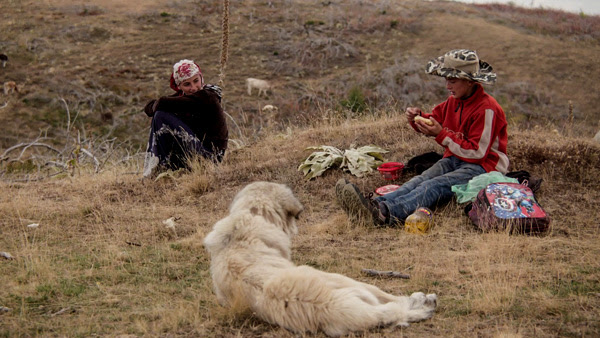
It would be the second premiere for Petra Seliškar this year after the mid-length documentaryMy Summer Holiday that recently premiered at FIPADOC in Biarritz. The two films share the location where they were shot: the mountain Šar in North Macedonia, the general topic of the life the life of the contemporary teenage shepherds torn between the tradition and the modernity, and also the production companies: the Slovenian and the North Macedonian branches of Petra Pan Films (represented by the filmmaker herself and Sara Ferro, respectively) and the French Cinéphage Productions (represented by Victor Ede).
CEE Animation Conference GO!2025
The CEE Animation Conference Go! 2025 that took place in Vipolže (Slovenia) and Gorizia (Italy) from March 11 – March 14 under the umbrella of the European Cultural Capital 2025 shared between Nova Gorica and Gorizia brought together various professionals from the field of animation for three days. Two key topics addressed and discussed were the concept of Green Animation and the establishment of the International Co-development Support Mechanism.
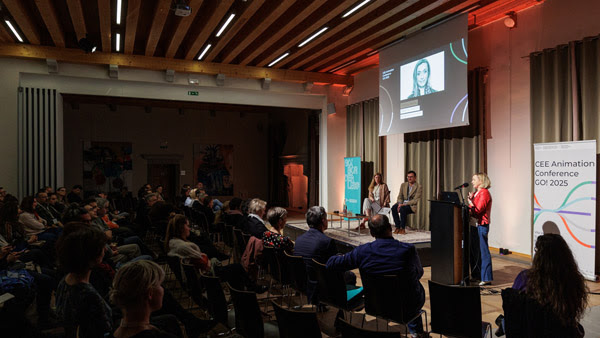
The discussions in this working group led by expert producer Jožko Rutar highlighted the disparities in national funding systems across Central and Eastern Europe, emphasising gaps between existing financial structures and industry needs. Given the longer development timelines and higher financial demands of animated films, a deeper understanding of the specific requirements of animation development is essential for effective regional support. The working group proposed a Recommendation Paper advocating for a balanced approach to funding animation development alongside other formats.
Another working group, led by expert Alissa Aubenque from Ecoprod (FR), addressed the environmental impact of the animation industry, recognising the sector’s dual responsibility in shaping cultural narratives while minimising its carbon footprint. Building on this momentum, CEE Animation Conference GO! 2025 drafted a position statement emphasising the need for specific Sustainability Guidelines that encompass environmental, social and economic aspects for all in the animation value chain and reflect coordinated industry efforts across Europe.
At the conference, the case study of the successful international co-production of the Tales from the Magic Garden was presented by three producers, Kolja Saksida, Juraj Krasnohorsky and Martin Vandas. Also, Sandra Jovanovska did the Organic Stop Motion exhibition inspired by her animated filmNo One Ever Looked at Elephants the Way You Do and her research Dimensions of Sustainability in Stop-Motion Animation.
More information is available here.
 About the Author
About the Author
Slovenian Film Centre’s monthly newsletter is written and edited by Marko Stojiljković.
Marko is a film critic with over the decade of experience in the field on the regional and international level. He regularly contributes to the international outlets like Cineuropa, Asian Movie Pulse and Eye for Film, as well as the regional ones like the daily paper Pobjeda in Montenegro, the show Filmoskop on Croatian Radio, web portal Lupiga and magazine Dialogi. He is also the co-founder of the web portal Ubiquarian, specialized in documentaries and short films and the member of the Slovenian branch of FIPRESCI and the Croatian Film Critics Association.




















